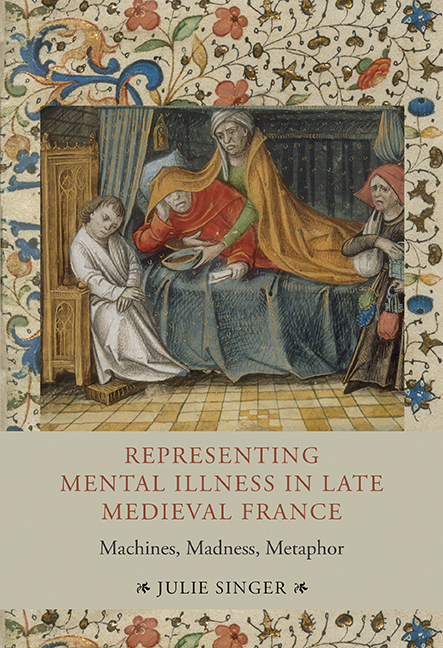Book contents
- Frontmatter
- Dedication
- Contents
- List of Illustrations
- Acknowledgements
- List of Abbreviations
- Introduction: Oxidation Before Oxygen
- 1 Of Metal and Men
- 2 Une enroullure de sapience: Instituting Princely Virtues at the Court of Charles V
- 3 Metaphors of the Body Politic
- 4 Le fer en la playe
- 5 Alain Chartier's rooil de oubliance
- Epilogue: Men Without Machines
- Bibliography
- Index
- Book part
4 - Le fer en la playe
Published online by Cambridge University Press: 15 October 2019
- Frontmatter
- Dedication
- Contents
- List of Illustrations
- Acknowledgements
- List of Abbreviations
- Introduction: Oxidation Before Oxygen
- 1 Of Metal and Men
- 2 Une enroullure de sapience: Instituting Princely Virtues at the Court of Charles V
- 3 Metaphors of the Body Politic
- 4 Le fer en la playe
- 5 Alain Chartier's rooil de oubliance
- Epilogue: Men Without Machines
- Bibliography
- Index
- Book part
Summary
Around the turn of the fifteenth century, the continued merging of Nebuchadnezzar's statue with the organic metaphor of the body politic takes on new significance in the light of Charles VI's mental illness and, particularly, in the light of the mad king's changed relationship with metallic objects, inorganic identity markers, and even his own materiality. In this chapter I will trace an arc from Philippe de Mézières's account of Nebuchadnezzar's statue in the Songe du vieil pèlerin (1389) to Jean Gerson's deployment of the same image in Rex in sempiternum vive (1413); in between, I will examine how Jean Froissart invokes the figure of Nebuchadnezzar at the moment of the king's first mental health crisis, how Pierre Salmon explores the link between Nebuchadnezzar's pride and his madness within an overtly contemporary context, and how Charles VI's own behavior, and the unorthodox “cures” to which he is subjected, reflect a similar preoccupation with inorganic stand-ins for royal authority. These repurposings of the Biblical statue illustrate innovative approaches to the very real problem of a sometimes incapacitated king, but are ultimately unable to reconcile the purity and incorruptibility of gold with the vulnerability and disorder of the monarch it represents. The king's mental illness has opened a wound in the body politic, such that the organic metaphor's ideal of bodily coordination and interdependence comes into direct tension with the disjuncture of the statue's disparate parts; the resulting strife is the “fer en la playe” ([iron] blade in the wound), as Gerson puts it, that prevents healing and reconciliation.
The madness of king Charles VI, lasting from the first acknowledged episode in August 1392 until the king's death in 1422, was a condition universally known. The constraints presented by the king's illness and the political upheaval that accompanied it had a transformative effect on French poetics, as Joël Blanchard has argued. Even highly politically engaged poets such as Christine de Pizan rarely characterized the king as mentally ill, though, preferring anodyne references to the king's “malady.”
- Type
- Chapter
- Information
- Representing Mental Illness in Late Medieval FranceMachines, Madness, Metaphor, pp. 173 - 244Publisher: Boydell & BrewerPrint publication year: 2018

